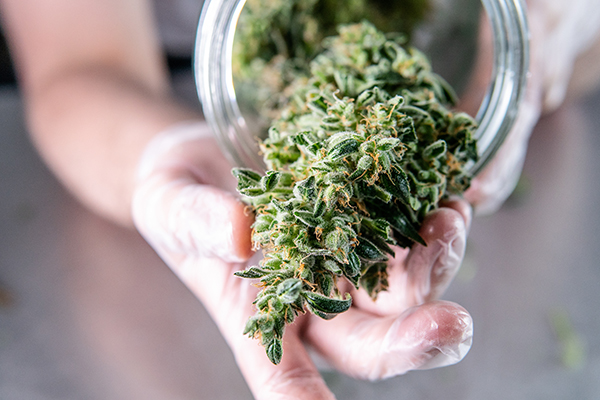Study: Marijuana users have high levels of HEAVY METALS in their blood and urine
12/18/2023 / By Olivia Cook

People who use marijuana, especially those who do so for recreational purposes, have higher levels of heavy metals in their blood and urine compared to non-users, according to a study.
The study published in Environmental Health Perspectives looked at more than 7,000 study participants and found that marijuana users have 27 percent higher levels of lead in their blood and 21 percent higher levels in their urine compared to people who don’t use weed. Users also had 22 percent higher cadmium levels in their blood and 18 percent higher levels in their urine than non-users.
The study authors from Columbia University noted that although tobacco is the main source of cadmium exposure in the general population, their research showed similar exposure levels among cannabis users. Both cadmium and lead stay in the body for quite a long time, said study lead author Tiffany Sanchez, an assistant professor of environmental health sciences at Columbia’s Mailman School of Public Health.
No amount of lead in the body is considered safe, according to the Environmental Protection Agency (EPA). The agency said lead exposures have declined in recent decades but still pose serious risks to public health.
The EPA also considers cadmium exposure harmful as it has been linked to kidney disease and lung cancer in people, and fetal abnormalities in animals. Cadmium is absorbed in the renal system and is filtered out through the kidney. So, when you’re looking at urinary cadmium, that’s a reflection of total body burden – how much you have taken in over a long period of chronic exposure.
The study results suggested marijuana is a source of cadmium and lead exposure. Research regarding cannabis use and cannabis contaminants, particularly metals, should be conducted to address public health concerns related to the growing number of cannabis users.
As cannabis plants can absorb heavy metals from soil – the new findings demonstrate that heavy metals in cannabis plants can also wind up in the human body. Previous studies have measured metals in marijuana plants, products or marijuana smoke. According to Sanchez, the study differed from most that measure metal levels in the cannabis plants rather than people consuming weed.
She added that the study could not examine whether the self-reported cannabis users were using medical or recreational marijuana. A future study should evaluate that to help definitively determine whether medical or recreational users had higher metal levels.
Heavy metals bind to cells and prevent organs from doing their job, according to the Cleveland Clinic. and symptoms of heavy metal poisoning can be life-threatening and can cause irreversible damage. Immunocompromised people, such as those going through chemotherapy, may be at greater risk from metal exposure or from other common cannabis contaminants like molds.
Data shows 52.5 million Americans ages 12 and older used marijuana in 2021
Marijuana is the third most used drug globally, according to the findings. Over 61 million Americans ages 12 and older have used illicit drugs as of 2021, with the most common being marijuana. This is according to data released by the National Survey on Drug Use and Health (NSDUH) of the Substance Abuse and Mental Health Services Administration (SAMHSA), an office under the Department of Health and Human Services (HHS).
Data shows 52.5 million of Americans belonging to that age group used marijuana in 2021. Meanwhile, the National Center for Drug Abuse Statistics (NCDAS) said drug abuse and substance disorders are more likely found in young males, with drug use the highest among people ages 18 to 25.
Still, the HHS recommended that the Drug Enforcement Administration (DEA) ease restrictions on marijuana by moving it from being a Schedule I drug to Schedule III. HHS Secretary Xavier Becerra said on X that the agency has responded to President Joe Biden’s request “to provide a scheduling recommendation for marijuana to the DEA.”
“We’ve worked to ensure that a scientific evaluation be completed and shared expeditiously,” Becerra added.
Senate Majority Leader Chuck Schumer (D-NY) lauded the move. “HHS has done the right thing and DEA should now follow through on this important step to greatly reduce the harm caused by draconian marijuana laws,” the New York senator remarked. Rescheduling the drug would reduce or potentially eliminate criminal penalties for possession. (Related: DEA claims cannabis holds no medicinal value even as the federal government owns the PATENT on its use as a medicine.)
HeavyMetals.news has more stories about heavy metal contamination.
Watch this BBC Three documentary about people considering marijuana use.
This video is from the Cannabis and Marijuana channel on Brighteon.com.
More related stories:
Big Pharma and the government are suppressing marijuana’s medicinal benefits.
NFL players and doctors fight for marijuana as opioid alternative.
Cannabis cure stories keep coming out.
Sources include:
Submit a correction >>
Tagged Under:
addiction, cadmium, cannabis, cannabis cures, Ecology, environment, Lead, marijuana, metals, poison, recreational marijuana, research, toxins, weed
This article may contain statements that reflect the opinion of the author
RECENT NEWS & ARTICLES
COPYRIGHT © 2017 METALS NEWS




















